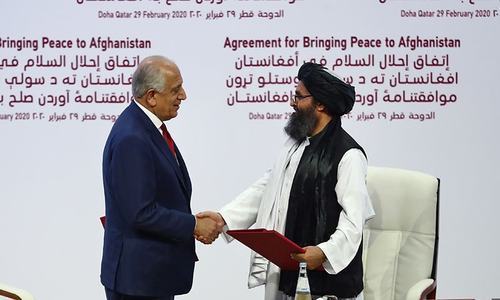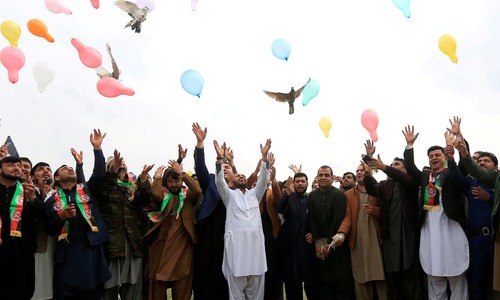Afghanistan's President Ashraf Ghani said on Sunday that a seven-day partial truce would continue but he rejected a key component of a new US-Taliban deal that calls for the release of thousands of insurgent prisoners.
The so-called "reduction in violence" period ran for the week preceding the signing of a historic accord between the US and the Taliban in Doha on Saturday.
The agreement spells out a withdrawal timeline of 14 months for all foreign forces, provided the Taliban honour several pledges and enter talks with Kabul for a more comprehensive peace deal.
Read: US, Taliban clinch historic deal for Afghan peace
“The reduction in violence will continue with a goal to reach a full ceasefire,” Ghani told a press conference.
“General (Scott) Miller has told Taliban to do so. It is expected (to continue),” he added, referring to the US commander in charge of foreign forces in Afghanistan.
A Taliban source did not immediately comment.
The partial truce saw scenes of jubilant Afghans dancing in the street as hopes rose that Afghanistan's 18-year-old war might finally come to an end.
No commitment to release 5,000 prisoners
But, in a sign of a bumpy road ahead, Ghani pushed back against a clause in the deal that calls for the Taliban to release up to 1,000 prisoners and for the Afghan government to release up to 5,000 insurgent captives.
“There is no commitment to releasing 5,000 prisoners,” Ghani said.
“This is the right and the self-will of the people of Afghanistan. It could be included in the agenda of the intra-Afghan talks, but cannot be a prerequisite for talks.” He added that any prisoner release was “not in the authority of the US, it is in the authority of the Afghan government.”
The president, who is mired in a political crisis following fraud allegations in his re-election, was referring to upcoming talks between the Taliban and the Afghan government that were agreed to as part of the deal.
The Taliban had until now refused to negotiate with Ghani's administration, which they considered a US puppet regime, but the withdrawal agreement hinges on Kabul and the insurgents reaching a separate peace deal through “intra-Afghan” negotiations.
Ghani's questioning of the prisoner release points to tough negotiations ahead in a country where leaders seem incapable of coalescing around important issues.
Washington has pointedly not yet acknowledged Ghani's win, announced last week after months of delays while his top rival Abdullah Abdullah has vowed to set up a parallel administration.
Afghan Taliban start diplomatic outreach after deal
The Taliban's political chief Mullah Abdul Ghani Baradar has met with senior diplomats from countries including Russia, Indonesia and Norway, hours after signing a deal with Washington aimed at ending the Afghan war, Taliban said in a statement on Sunday.
Taliban political chief met foreign ministers from Turkey, Uzbekistan and Norway in Doha along with diplomats from Russia, Indonesia and neighbouring nations, the Taliban said, a move that signalled the group's determination to secure international legitimacy.
“The dignitaries who met Mullah Baradar expressed their commitments towards Afghanistan's reconstruction and development [...] the US-Taliban agreement is historical,” said Taliban spokesman Zabiullah Mujahid.
“Baradar received congratulatory messages and thanked them (ministers and diplomats) for attending the ceremony,” he said.
The Taliban ruled Afghanistan from 1996 to 2001 after seizing power following years of civil war, and imposed many restrictions on women and activities it deemed "un-Islamic". After being ousted from power in 2001, the Taliban have led a violent insurgency against the internationally-backed government, killing thousands.
The Afghan war has been a stalemate for over 18 years, with the Taliban increasingly controlling or contesting more territory, yet unable to capture and hold major urban centres.
During the last two years of direct negotiations with the United States, the Taliban leaders opened direct channels of dialogue with Pakistan, Iran, Russia, China, Germany and Islamic nations, a move that poses a direct threat to the legitimacy of Ghani's government.
“The fanfare around the signing ceremony proved that many countries are willing to start fresh talks with Taliban leadership [...] they are also working fast to secure the validation too,” said a senior US diplomat who was present at the signing ceremony in Doha.














































